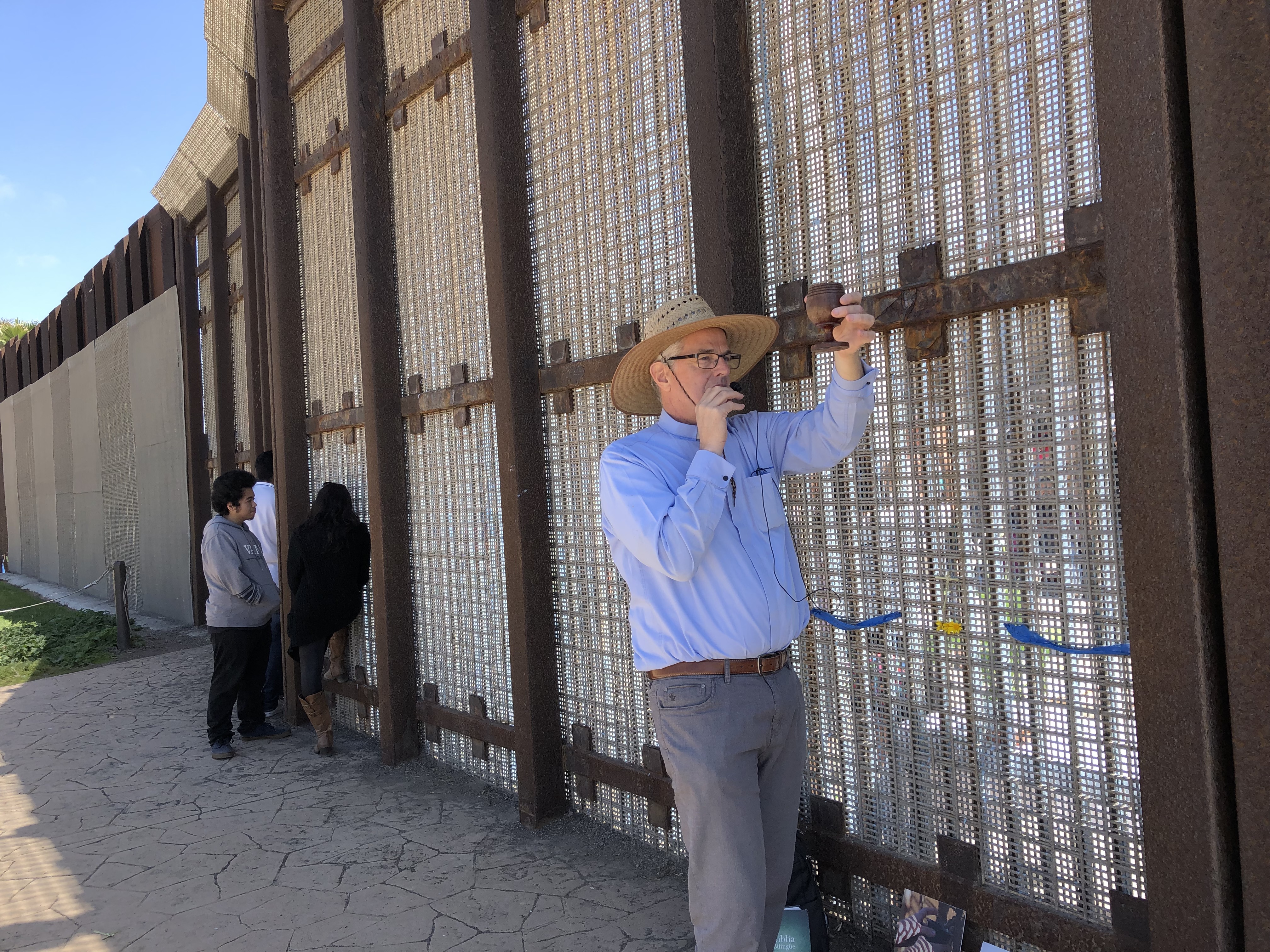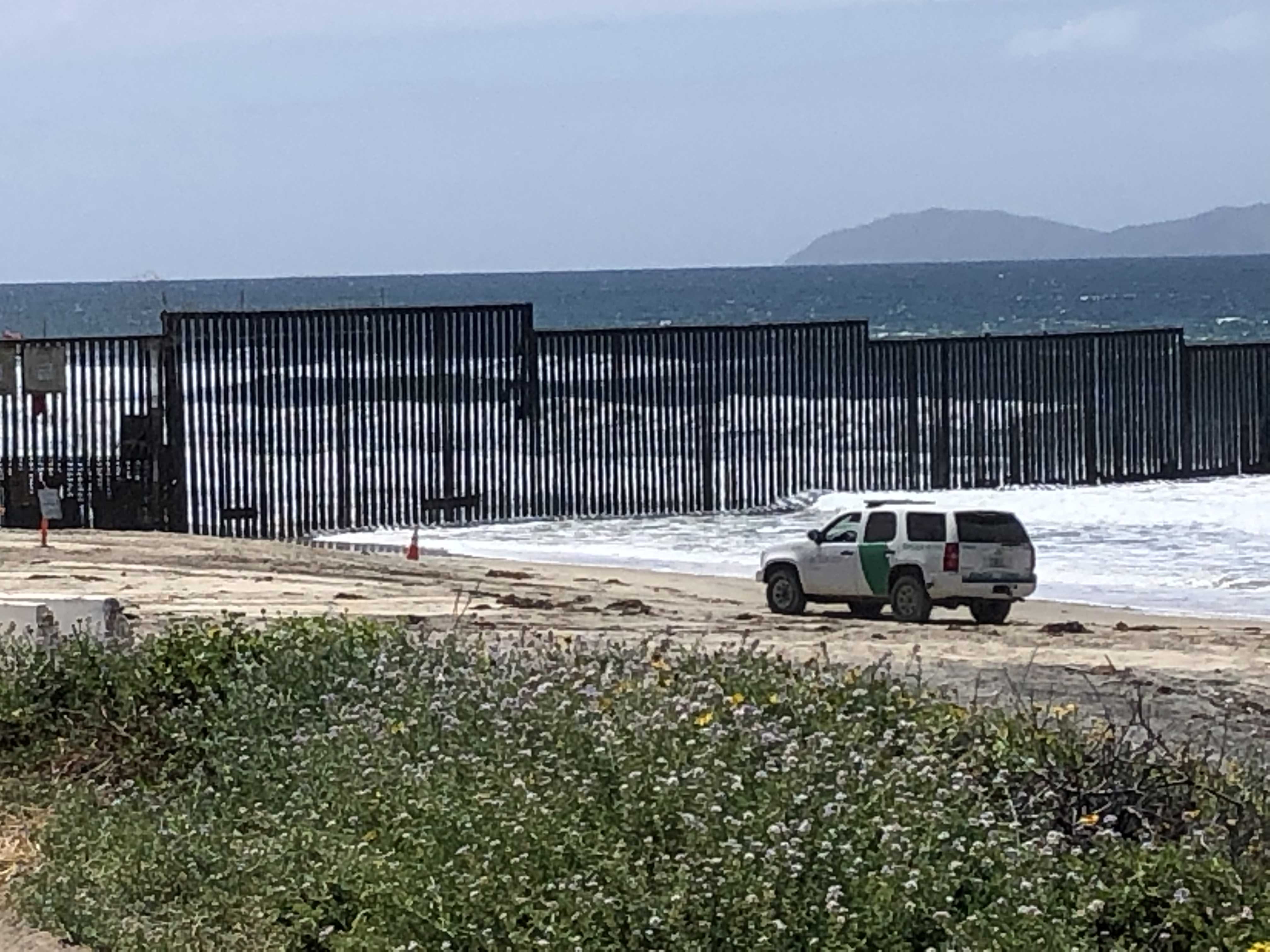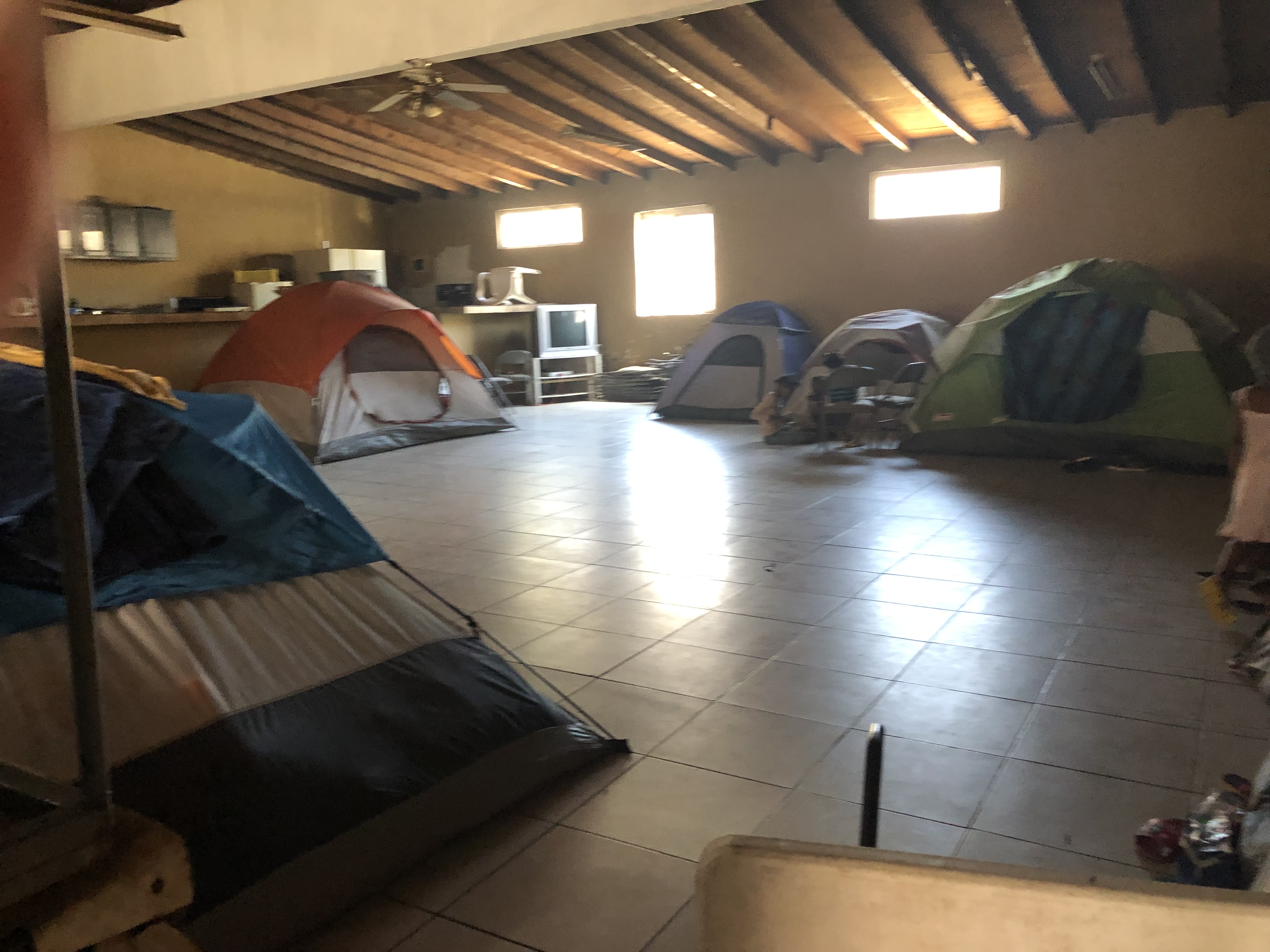Colonel Ann Wright reports on the life in limbo for people along the southern border who are applying for refuge in the U.S.
 The U.S.-Mexico border at the Pacific Ocean is composed of two very tall fences, with a no man’s land of about 30 feet in between. Sensors and cameras alert U.S Border Patrol guards of any activity on or between the fences.
The U.S.-Mexico border at the Pacific Ocean is composed of two very tall fences, with a no man’s land of about 30 feet in between. Sensors and cameras alert U.S Border Patrol guards of any activity on or between the fences.
Thousands of people hoping for asylum in the U.S. are waiting for hearings in tents, shelters and detention facilities in cities on both sides of the border. Rev. John, a Methodist pastor, has been working for the past 25 years with immigrants and refugees both in Mexico and in the United States. He said that each U.S. administration has tried to use fences and walls to stem the flow of newcomers.
Despite the double fence, people keep coming. Most, Rev. John said, are turning themselves into U.S. Border Patrol rather than enter illegally. While still in Central America, many speak by phone with U.S. friends and relatives and develop leads on work and housing before they leave home. He noted that documenting the violence that many are trying to escape — the beatings, murders, burning of businesses and homes — is much easier now that cellphone cameras are prevalent. This can be used as evidence in asylum hearings.
Each Sunday, U.S. Border Patrol opens up an area called Friendship Circle in the binational International Friendship Park, which separates the U.S. side in San Diego from the Mexican side in Tijuana. The circle gives families an opportunity to communicate directly through the fence with relatives on the other side. Ten people at a time are allowed to pass through a gate into this area, which is about a hundred feet long and where the wall is at least 20 feet high. Slatted fencing is covered by several layers of tightly woven steel mesh. Only finger tips can reach through and touch. Small holes in the mesh create a pixilated view of the person on the other side.
Holiday Divide
The predicament of families and friends divided by U.S. immigration policies is particularly poignant at holidays. This past Easter, while President Donald Trump was in Florida, at his luxurious spread in Mar-a-Lago, people were making their way to both sides of the beach fence at International Friendship Park.
Some on the Mexican side sang for the crowd. Members of a support group for deported U.S. military veterans served food.
On the Mexican side it’s possible to park along the beach and quickly reach the fence by foot. Reaching the U.S. side, however, involves parking a mile and a half inland and walking the rest of the way. On Easter weekend yellow, red and blue spring flowers covered the marshlands and small hills along the rutted road. While the Mexican side of the beach was full of people, the U.S. side was empty except for Border Patrol vehicles and occasional family groups, many with baby strollers.
Two families on the U.S. side were talking with members of their extended family from Honduras who, like many others, were waiting in Mexico for their numbers to be called by U.S. Immigration and Customs Enforcement, or ICE, so they could be interviewed. One family has been waiting for weeks for an interview in San Diego. In the meantime, they are living in shelters in Tijuana.
On the Mexican Side
I had been on the other side of the border several days earlier after entering Mexico at the Tijuana-San Yisidro crossing. After emerging from Mexican immigration and the fenced border-crossing passageway I entered a large plaza.
Each morning this plaza fills with people waiting for U.S. Customs and Border Protection to arrive to give out numbers for asylum application hearings. After receiving their numbers, the people leave the plaza and a second group begins arriving — those who expect their numbers to be called that day by ICE. Days or weeks can pass between getting a number and getting called. During that time, individuals and families must find someplace to stay in Mexico.
When a number is called, the corresponding individual or group is transported into San Diego where a hearing officer makes a preliminary decision on the asylum claim. Then things can get confusing.
In some cases, if a claim is approved for a final court appearance the person gets taken to a detention facility in the San Diego area. A few are released with an ankle bracelet and are allowed to stay in the U.S. with a sponsoring host family. But most, under a new U.S. policy called “Return to Mexico,” are sent back to await the second interview.
Since applicants have no way of knowing which of these three options will pan out, they take their belongings with them, to be ready for anything. The shelter in Mexico where they have been staying may not have a space if they are sent back. One U.S. judge reportedly told an applicant: “If I return you to Mexico, the issue of where you are going (to stay in Mexico) is not before the court.”
In a particularly inconsiderate arrangement, people who have received numbers at the Mexicali-Calexico crossing do not have hearings in Calexico, the closet U.S. town, but must travel to Tijuana, a two-and-a-half hour drive away. Local churches and civic organizations that lodge applicants in Mexicali organize buses and vans. Missing the calling of a number is the end of the line. The case will not be heard later.
Filled to Capacity
On the Mexican side of the border, churches and other assistance groups are filled to capacity with those waiting for their numbers to be called. A Catholic Church, Igelsia Embajadores de Jesus (Church of Jesus’s Ambassadors), is one of the places in Tijuana that provides shelter. The unpaved road leading to the church has large potholes and is impassible by vehicle during the rain. Gustavo Banda, the pastor of the church for the past 25, said that the church is currently housing 250 people, but has held over 500 at times.
Approximately 100 Haitians and 150 Central Americans are living in small tents inside the church. Each family has one or two tents depending on its size. Cooking is done by residents; one kitchen is for spicy Haitian food and another for Central American cuisine. Mexico allows applicants to work while they are waiting and several people have found daily/hourly low paid work. Each morning, they walk up a winding paved road on the last hill that leads up to the four-lane road to Tijuana to get to work. Pastor Banda said that those working proudly contribute what they can to the purchase of food for the kitchens.
However, that is not enough to feed everyone so the church seeks donations. Our Veterans for Peace national organization made a $1000 donation that the Deported Veterans chapter uses to buy water and food for those housed at the church. Donations to help with food and water can be made to VFP with a comment “For Deported Veterans Project for food and water for asylees.”
On the U.S. side of the border, organizations in San Diego have a rapid response team that gets daily calls from ICE saying they are releasing people from detention facilities. These people need assistance finding places to stay during the final adjudication of their cases, which may take many months.
The detention facilities, meanwhile, are reportedly overcrowded, frigidly cold and very unfriendly. In response, a local coalition of nonprofit organizations, the San Diego Rapid Response Network, provides short-term shelter. Members of this network include Jewish Family Service; the American Civil Liberties Union of San Diego and Imperial Counties and Safe Harbors Network, a coalition of religious and other groups.
Last month, a family in San Diego was hosting a family awaiting adjudication of their asylum application. The father, mother and teenage son are Jehovah Witnesses from Russia. After waiting for six months in Mexico, they were allowed into the U.S. and put in a detention facility. They were placed in the private home through Safe Harbors. Both parents wear ankle bracelets and are waiting for a hearing on whether they can work in the U.S. while they wait for the final adjudication. The Rapid Response Network is sheltering 11 more Russians.
ICE has used Safe Harbors as its drop-off location for pregnant women or for women who have just given birth in San Diego hospitals. The ministry’s founder, Pastor Bill Jenkins, said that in 2018, 24 babies were born to women seeking asylum and living in the church — about one every two weeks. “Sometimes I wonder if I’m running a shelter or a maternity ward,” Jenkins said.
Meeting the Buses
Last autumn while in McAllen, Texas, a group of us with Veterans for Peace witnessed buses arriving from detention facilities in south Texas. The local branch of Catholic Charities, the anti-poverty network based in Alexandria, Virginia, meets buses that arrives each afternoon with people released from detention. The buses let the people off three blocks from the bus station and they are told to “walk straight ahead for three blocks.”
Volunteers greet them at the station and help get them get bus tickets to the cities of their sponsors. If they arrive so late in the afternoon or evening that they have missed their bus, Catholic Charities houses them in a nearby shelter for one night. These people are not free. Everyone who is 16 or older wears ankle “bracelets” until they are either awarded a status or deported to their home country.
In Albuquerque, New Mexico, I spoke several weeks ago with the consortium of volunteer agencies that meets buses arriving from detention facilities in New Mexico and from some facilities in Texas. Agencies in border cities in Texas are overwhelmed so ICE transports some released detainees to New Mexico. ICE sometimes gives Albuquerque agencies 12 or 24 hours’ notice of arriving buses, sometimes not.
in Tijuana, Al Otro Lado (On the Other Side) is a legal collective that includes U.S. immigration lawyers who help applicants prepare for the hearing in the U.S. ICE, apparently, frowns on Al Otro Lado as a group that coaches applicants on what to say to make their claim more believable. Al Otro Lado lawyers say that most asylees have no idea what the hearings entail and they are merely explaining what to expect. Al Otro Lado is one of many organizations trying to make the application process more humane.
Ann Wright served 29 years in the U.S. Army/Army Reserves and retired as a colonel. She was a U.S. diplomat for 16 years and served in U.S. embassies in Nicaragua, Grenada, Somalia, Uzbekistan, Kyrgyzstan, Micronesia, Afghanistan and Mongolia. She resigned from the U.S. government in March 2003 in opposition to President George W. Bush’s war on Iraq. She is co-author of “Dissent: Voices of Conscience.” A version of this article was first published by Roots Action.




In the fifties when I was at Fort Hood we visited Mexico for obvious reasons. What struck was the contrast from the US town of Del Rio and the Mexican village Villa Cuna, now Ciudad Cuna. Brothers pimping for sister for $2. We are gifted by where we are born.
The solution cannot be in the extreme that people on one side of the border can simply walk across the border and voila, problem solved.
Border serve good and bad reasons, but mostly good, and the people within those borders have a right to determine who is allowed to enter and who is not. The people have lost that control and it needs to be restored. Looking at the condition of those heading north it is obvious that are not starving, nor are they dressed in rags. They are coming north because they can. Something most of us would do if we were in their situation.
The solution often offered and of which I am in sympathy is to help people where they are. But given the current climate that would only work in the long term and may never work. In the short term, we’re going to have to get serious about controlling our borders and getting the cooperation of countries south of our border.
In the process of getting the matter straightened out, American has got to stop thinking in factional terms, which now means if Trump wants something, it’s got to be bad or good depending what faction you’re in.
That seems to be the MO today which doesn’t serve our citizens very well.
Sadly, the one place where factionalism doesn’t exist is in our Middle East policy where both are on the wrong side. Ditto, Russia and China where both seem to want to test how far we can push both countries.
60 Minutes did a piece on Middle East Immigrants coming into NY’s JFK in the late 70 seeking asylum. They were checked against a watchlist, put up for the night, seen in court the following day and told to come back in 30 since the docket was so full.
How many came back? Exactly. In fact the head of the entire operation at JFK was so terrified to answer the relevant questions on camera it was mememorable.
And many don’t rememeber It was Ronald Reagan a few years later who granted Illegals Amnesty. But why has nobody ever fixed the problem I wrote about earlier?
The fact is there have been laws on the books for years to deal with this problem but both parties turned a blind eye to it. For the Democrats it’s always been about votes, for the Republicans cheap labor.
Seems to me if you’ve been a contributing member of your community for a number of years with no criminal record there should be a path to citizenship made for people like this. But how do you define the parameters? A heavy lift indeed.
As to this ridiculous comparison of todays immigrants to those at Ellis Island remember those people did not come into this country and collect benefits. They worked for pay that gave them enough to barely survive.
An absurd comparison.
What a mess.
Glad to see CN readers are still commenting on this topic. I just heard JBS present what they feel the larger agenda is of the planned and financed mass immigration taking place. Listen at https://youtu.be/vwilzAzqHg.
Thank you, Ann Wright, for bringing forward the suffering of refugees, whether economic or political. There are several reasons that the US is substantially responsible for this:
1. The US has actively subverted socialist governments in Central and South America, by supporting crime gangs in lengthy wars of aggression unknown to the People of the United States. Chile, Argentina, Venezuela, Nicaragua, Honduras, Cuba, Bolivia, etc., etc. These wars have resulted in a reign of violent gangs from which refugees flee to the US.
2. Those governments subverted were far more efficient in meeting the needs of their people, and are replaced by kleptocratic dictatorships that follow the Repub gangster fantasy that money=virtue to rationalize kleptocracy and ignore the suffering of their people. Public services are eliminated, and refugees result from the US aggressions.
3. There are economic refugees simply seeking opportunity in the US, like nearly all of our ancestors. The US has done virtually nothing to assist the economic development of S.A. and C.A., less than one meal a year per capita since WWII, when it could easily have built all of the roads, schools, and hospitals, and educated those people to operate businesses that would by now have made those countries prosperous. The result would have caused few economic migrants. The US did nothing for humanity as always, and deserves the results.
4. Even now the US could establish a self-financed program of economic benefits to nations that export goods to the US, competing with our own and displacing our workers. Simply tax all imports to bring prices into line with US products, and return the tax as foreign aid to the poorest of all nations. Why not? It would save US jobs, restore our industries, benefit billions of the neediest, eliminate economic migration, and solve US security problems overseas. But Oh No we cannot do that, it would reduce bribes to political parties dependent upon Wall St investor profits.
So again, the US entirely deserves the result, and it entirely deserves economic embargo by the entire world. Unfortunately even when that happens, it is likely to survive as a rapacious kleptocracy of the corrupt DemReps, exploiting its own people as it has done to the rest of the world. Much better if it was recycled as a real democracy to serve its own people.
Do you know the American definition of asylum. These illegal are coming to work and other free hand outs. Please stop being fake news.
No, Ron, the US is substantially complicit; please see my comment above. Our ancestors came to the US in search of economic opportunity. The US had the opportunity to assist the poorest of all humanity, and preferred barbecues and fancier cars. That is not a solution or an excuse to remove the ladder for others.
Neither Party cares anything about illegal aliens beyond their being exploitable cheap labor for rich donors who need cheap employees, and as numbers for the Census apportionment of US House of Representatives and associated Electoral College votes (Plos ONE published a scientific article demonstrating there are over 20 million illegal aliens. Many states will lose federal districts and Representatives to Sanctuary States, if illegals are counted). Thus illegal immigration is just an “unsolvable” Election issue and illegal aliens are always treated horribly by the Party in power:
https://www.truthdig.com/articles/how-bill-clinton-paved-the-way-for-trumps-war-on-immigrants/
https://www.counterpunch.org/2018/10/02/whose-moral-stain-hold-democrats-accountable-on-immigration-too/
Sad. Man’s inhumanity to man on display. A deeply flawed human culture and it’s wreckage. Love or perish.
The article makes the immigration crisis seem quite benign with “most” fleeing “violence.” Many who were interviewed in the past that I’ve heard readily admitted they were seeking “economic opportunity.” Some, it has been determined, may be coming to incite violence in the US! Amazingly, the article sounds as though pregnant women are being given free opportunity to have their babies in the US, with not-hidden obvious motives. The article entirely leaves out the many problems CN readers know exist, for example, our lack of resources to cope with the enormous increase in numbers seeking to enter. Families separated, hardship on charities, only heart-wrenching one-sided sympathy-seeking stories presented! Nothing about the strain on ICE, or our own citizens’ problems and whether or not they are being adequately addressed!
On a different subject but important, free speech is being threatened and has been for a while. Hope to see more about it on CN, but meanwhile there’s an informative article about it on RT with title of “setting aside hatred of Trump for a day.” The question begged is whether, for the sake of political correctness, we are willing to have Facebook, Google, …social media use its algorithms to determine what would be available to us to read or view. You decide! or will you?
Whose fault is the refugee crisis? The refugees, or the cruelly unjust US policies towards our southern neighbors? We in the US caused all this suffering, and now we want to blame somebody else for it. Typical exceptionalist behavior.
Yup, privitize the profits, socialize the losses, as usual in “democracies.”
This does not make sense please clarify where you information comes from
Ron, please see my comment above. Mike is referring to such processes as the cause of such migration.